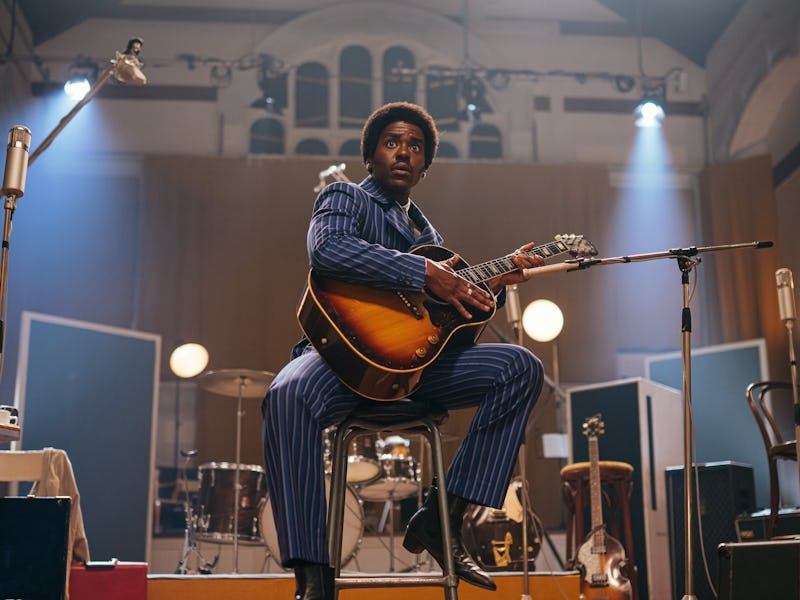Doctor Who's Beatles Episode Didn't Actually Need The Beatles
"The Devil's Chord" was cool. But why were the Fab Four here?

Seeing the Beatles record their first album, Please Please Me in February 1963, would, of course, be amazing. And, that basic desire — to watch the formation of the recording career of one of the most influential pop and rock bands ever unfold in real-time — is what sends the Last of the Time Lords, and his human companion back in time in a very zany, and every uneven episode of Doctor Who. The only problem is that Doctor Who’s big Beatles episode, “The Devil’s Chord,” didn’t need the Beatles at all. In fact, it would have been better off to leave the Fab Four out of the story all together.
Spoilers for Doctor Who’s “The Devil’s Chord” ahead.
For Who fans, the second of the new episodes, “The Devil’s Chord,” will feel satisfying. It’s chock full of references to the entire breadth of the series; from the very first episode with William Hartnell’s 1st Doctor, to the most recent adventures featuring David Tennant’s 14th Doctor. “The Devi’s Chord” also gives us a compelling villain in the form of Maestro (Jinkx Monsoon), plus a contemplative sci-fi concept on how the existence of music shapes our experience of life, the universe, and everything. On top of all of that, this episode also dropped very tantalizing clues about the rest of the season-long mysteries, including what seemed like hints about the Master, plus a mysterious character known as “The One Who Waits.” All-in-all, this is good stuff. There’s just one problem: Ruby and the Doctor’s entire reason for going to 1963 to see the Beatles ended up superfluous.
The “Beatles” attempt to jam out in a much sadder timeline.
While it's tempting to fixate on the actual casting of John, Paul, George, and Ringo, it’s also a superficial complaint. Longtime Beatles fans know that actors playing these giants of pop culture is always a tricky proposition, and so George Caple, Chris Mason, Philip Davies, and James Hoyles, are simply following in the footsteps of other actors who have been given this utterly thankless job (which also includes, interestingly, former Doctor Who star Christopher Eccleston who played John Lennon in an underwhelming 2010 biopic Lennon Naked). So no, the problem with the presence of the Beatles in the Doctor Who Beatles episode isn’t the casting or the acting.
One might assume the wonky history is at fault here: John didn’t really start rocking those glasses until after 1965, the Beatles would never have had a recording contract without a love of music in the first place, and, what made Please Please Me a big deal at the time was the Beatles complete involvement in crafting the overall record in general. That said, Doctor Who has always played fast-and-loose with these kinds of things, and, in a way, getting upset about historical inaccuracies in Doctor Who also feels petty.
What’s really troubling about the Beatles in ‘The Devil’s Chord” is simply the way the episode is written. The idea that the world will fall into utter desolation without music in general (and the music of the Beatles in specific) is a powerful idea. But, oddly, it could have been accomplished without giving the Beatles so much screentime. When the Doctor and Ruby have heart-to-hearts with John and Paul, we’re meant to feel sad about these depressed versions of artists who we imagine to be ebullient and full of life at this point in their lives. The problem is, the depressed, downbeat vibe ascribed to the bizzaro Beatles isn’t a trait unique to them in this episode. Thanks to the meddling of Maestro, everyone in this timeline has a knee-jerk boredom with music, giving the dialogue from all impacted humans a kind of Twilight Zone-vibe. This is a fine idea, but it falls flat because, in the context of this episode, we don’t understand what makes the Beatles special. They simply sound like everyone else who has fallen under Maestro’s spell.
So, the viewer is required to fill in the gaps on their own as to what is great about these men, because whatever it is that they do accomplish, feels like a hand-wavy deus ex machina. Generally speaking, when the Doctor encounters great historical figures — from Robin Hood to Rosa Parks to Nikola Tesla, to Mary Shelley — we’re excited about how cool these people are, even if there’s a timey-wimey problem. “The Devil’s Chord” doesn’t do this. The Beatles aren’t written as cool at all, leaving you to wonder why the episode even bothered including them.
The Beatles couldn’t not be fun and funny in the early 1960s.
In real life, all four members of the band were known for their bitingly witty banter. Seriously, if you watch any interviews with the Fab Four from the early days, it's generally hysterical. Doctor Who showrunner Russell T Davies has pointed out that getting the rights to Beatles music was off the table for this episode. That’s fair and makes sense. But why not actually try to capture their hilarious personalities? If we’re meant to swallow the idea that these guys somehow managed to meet at all in this topsy-turvy timeline, why not give us some version of why they were so interesting? Why not let the Beatles be funny? Instead of the Fab Four, “The Devil’s Chord” gave us the Dour Four. Yes, the Doctor and Ruby were there to fix the timeline, but it may have been better if the episode had played out differently.
Imagine the Doctor and Ruby walking into the future Abbey Road studios and just finding... nobody. One-time Doctor Who writer, Richard Curtis, did this basic premise with the movie Yesterday, which, accidentally contained a lesson for this Doctor Who installment. If you’re going to do a sci-fi premise about a world without the Beatles, your best bet is to show the Beatles as little as possible.